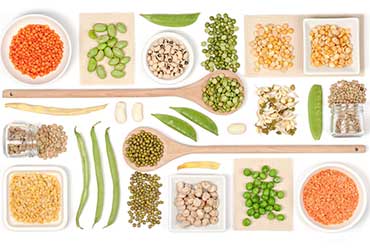Research shows that humans have been following vegetarian diets since as early as 700 B.C. There are many different types of vegetarian diets, which are followed due to religious, health, cost, and ethical reasons. Vegetarian generally means a diet does not include any meat, poultry, game, fish, shellfish or by-products of animal slaughter. This way of eating usually contains various levels of fruits, vegetables, grains, pulses, nuts, and seeds. Some vegetarians also eat dairy products and eggs. On the other hand, vegan diets are more recent and are stricter because it generally means avoiding all animal and animal-derived products. So, a vegan diet is the strictest form of vegetarianism.
If you are considering a meat-free diet, there are many health considerations to think about. Research shows that these diets tend to be low in saturated fat and cholesterol. Vegetarian and vegan diets also tend to be high in the amounts of vitamins, minerals, fiber and healthy plant compounds consumed. And they include an abundance of nutritious fruit, vegetables, whole grains, nuts, seeds, and soy products. The healthy factor of a vegetarian or vegan diet directly depends on how you prepare your food – a breaded and fried zucchini is not more healthy than a French fry, for example. One the other hand, poorly planned vegetarian and vegan diets could result in low intakes of some nutrients, particularly iron, calcium, zinc and vitamin D.
How to choose one over the other
The Academy of Nutrition and Dietetics and several scientific reviews report that both vegetarian and vegan diets can be considered appropriate for all stages of life, as long as the diet is planned well. Low amounts of nutrients such as omega-3 fatty acids, calcium, and vitamins D and B12 can negatively impact various aspects of health. Our brains actually need some amount of fat to function properly. And most medical professionals considers a plant-based diet as “heart smart”.
If you are planning to change your diet, you should consult your physician as well as analyze your daily nutrient intake, check your blood nutrient levels, and consider taking supplements accordingly. Again, generally both types of diet can be considered safe for all stages of life, but vegan diets may even offer additional health benefits. It's important for all plant-based diet followers to plan their meals and shopping well in order to avoid health problems over the long term.

